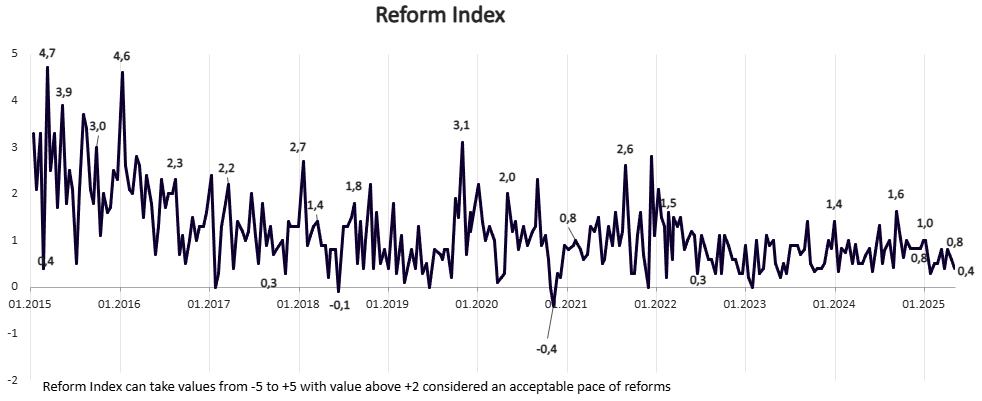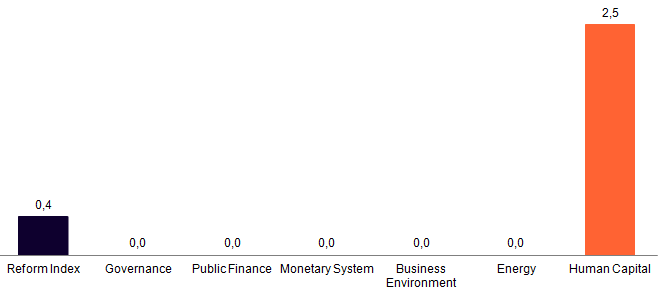Between April 21 and May 4, experts from the Reform Index recorded five reforms. All were categorized under Human Capital and received a score of +1 point from the experts. Issue 263 highlights two of them — a law that tasks school and university leaders with supporting student volunteerism and a resolution that sets the rules for operating a digital public health platform. The overall Reform Index score for this release stands at 0.4 points, down from 0.6 in the previous issue.
Graph 1. Dynamics of the Reform Index

Graph 2. Values of the Reform Index and its Components in the Current Assessment Round

Law on promoting student volunteering, +1 point
Leaders of educational institutions — including schools, colleges, vocational schools, and universities — now have the task of strengthening support for volunteering and promoting its development during students’ free time. Law No. 4186-IX clarifies that volunteering may be recognized as academic practice if it relates to the student’s field of study. Students will be able to officially confirm their volunteer work by requesting documentation from the organizations they supported. These organizations are required to provide such confirmation upon request, specifying the nature and duration of the volunteering. Based on this documentation, educational institutions may formally count volunteering as one of the recognized forms of education.
Another new provision is the inclusion of volunteer experience in the motivation letter submitted by applicants to higher or professional pre-higher education institutions. While not a mandatory part of the letter, volunteer experience may serve as an additional advantage at some institutions when evaluating candidates with identical scores.
Information about the Reforms Index project, the list of Index experts and the database of the regulations assessed are available here.
Expert commentary
Nataliia Povtar, Lawyer, Civil Society Direction at the Centre for Democracy and Rule of Law:
“Law No. 4186-IX introduces several important changes aimed at recognizing the outcomes of volunteer activity and fostering a culture of volunteering among children and youth. In particular, it establishes the right of volunteers to have their acquired competencies formally acknowledged, requires organizations to issue official confirmation of volunteer activity [upon a volunteer’s request – ed.], and obliges education leaders to promote volunteering among participants in the educational process.
The proposed changes are expected to encourage greater participation in volunteering among children and youth. However, it is important to note that some provisions — like recognizing volunteer experience as educational practice — are largely terminological. For example, the phrase ‘educational and industrial practice, if carried out in a field related to the student’s specialty’ was replaced with ‘practice in accordance with the educational program of the institution’ — meaning no new mechanism was introduced.
While the law is designed to encourage student volunteering, it does not address the participation of children under 14. Current legislation allows volunteering from age 14 with parental consent, while the involvement of younger children is not officially recognized. This gap is inconsistent with international standards — such as the Universal Declaration on Volunteering — and contradicts Ukraine’s national youth policy, which affirms the right to civic participation (e.g., in children’s public organizations) starting at age six.
In neighboring European countries like Poland, eligibility for volunteering depends not on age but on whether the child has the necessary skills and whether safe conditions are ensured. If Ukraine truly intends to develop a systemic culture of volunteerism from an early age, it must adopt a similarly flexible approach.
Subordinate regulations governing how competencies gained through volunteering will be recognized will also require close public oversight. Without well-developed procedures, these legal provisions risk remaining purely symbolic.
Law No. 4186-IX is an important, though interim, step. To achieve its intended goals, further legislative work is needed — to lift age restrictions and introduce meaningful tools to support the engagement of children and youth in volunteer activity.”
Olena Vuzka-Malets, Program Director at NGO Ukrainian Volunteer Service:
“This law is a step in the right direction. It creates opportunities — to support students who are already volunteering, to foster a culture of collaboration between schools and civic organizations, and to send a clear message: volunteering is about personal choice, not a mandatory requirement.
It is especially valuable that the law’s final version preserves the emphasis on voluntariness. Its implementation gives educators a legitimate way to support volunteerism and build community partnerships. For schools, this does not mean an obligation to ‘organize volunteering’ but rather a chance to support students’ existing initiatives or to collaborate with civic organizations. If a community has a reliable NGO or volunteer initiative, its representatives can be invited to partner with the school — or students can take part in volunteering through extracurricular activities. In addition, if high school students want to act as tutors for younger peers, they can be supported — and it should be emphasized that this is also volunteer experience. Students can then include it in their motivation letters when applying to universities, which may influence admissions decisions when standardized test scores are equal.
This law creates space for schools to foster civic responsibility without coercion — and that is where its real strength lies.”
Launch of a public health information platform, +1 point
The Cabinet of Ministers has approved the procedure for operating a public health information platform. This unified online system will provide access to data on the population’s health and the key factors that influence it. The platform will publish statistical data on disease prevalence, medical services, pharmaceuticals, medical licensing, preventive and immunization measures, and information related to the Medical Guarantees Program. It will also include data on health determinants — such as environmental conditions, nutrition, and lifestyle — along with health risk assessments, public health research, and forecasts related to population and environmental health
The data will be sourced from the registries of the Ministry of Health (MOH), the National Health Service of Ukraine (NHSU), laboratories, and other existing databases maintained by central government bodies. It will be regularly updated. Various levels of access to the platform will be granted to government authorities, civil society and international organizations, healthcare professionals, and the general public.
Cooperation between Ukraine and the EU in the field of healthcare includes strengthening the public health system, developing disease surveillance, and responding to threats to population health. This digital platform will enable the systematic collection and transmission of relevant data to the EU, which is essential for assessing Ukraine’s progress in aligning its laws and practices with EU standards.
Expert commentary
Nataliia Tulinova, Director and founder of ZDOROVI:
“The creation of a public health information platform is a positive step. For patients, it means that all essential information about public health and the healthcare system will be available in one place. For doctors and officials, it allows faster identification of problems and quicker paths to solutions.
Patients will better understand which diseases are common in their communities and which preventive measures are effective. This builds trust that their health is being taken seriously and that the system is becoming more transparent, predictable, and user-friendly.
This step is also highly significant for Ukraine’s European integration. We are moving closer to EU standards, and the platform will help us fulfill international obligations, receive EU support, and adopt best practices from across Europe.
There is still room for improvement in terms of protocols and quality. However, step by step, Ukraine’s healthcare system can become more modern and effective, ensuring that patients receive care that meets European standards.
It is essential that the platform ensure the protection of personal data. For it to work well, information must be updated regularly, and both doctors and patients need to understand how to use it. That likely means systematic training will be required.”
Ruslan Savchuk, Chair of the Board of the All-Ukrainian Association of Public Health Specialists:
“Adopting the resolution on the procedure for operating a public health information platform is a key step toward strengthening Ukraine’s healthcare system. The document sets clear rules for collecting, processing, and using public health data. This will support more effective population health monitoring and timely responses to public health challenges.
The platform will allow data from multiple sources to be integrated and used to provide analytical support for informed decision-making. Crucially, it lays the foundation for developing digital tools in disease prevention.
It will also help public health professionals work with greater accuracy and speed. Access to reliable, up-to-date data is expected to support the development of effective policies and programs — and move Ukraine closer to European standards in digital health.
Transparency and openness of data are also critical for building public trust in the system. This step is part of a broader transformation of public health — one that serves the interests of every citizen.”
Reform Index from VoxUkraine aims to provide a comprehensive assessment of reform efforts by Ukraine’s authorities. The Index is based on expert assessments of changes in the regulatory environment in six areas: Governance, Public Finance, Monetary system, Business Environment, Energy, Human Capital. Information about the Reforms Index project, the list of Index experts and the database of the regulations assessed are available here.
Attention
The author doesn`t work for, consult to, own shares in or receive funding from any company or organization that would benefit from this article, and have no relevant affiliations



